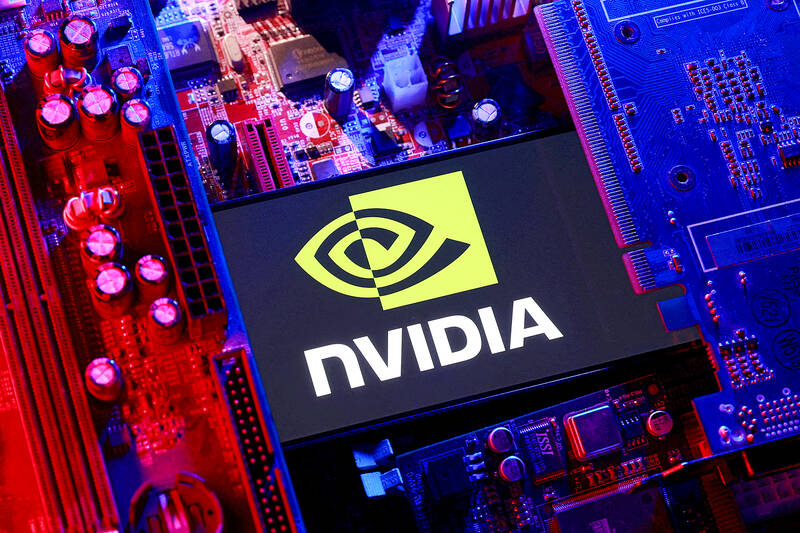China’s Internet regulator has ordered top technology firms to halt purchases of Nvidia Corp’s artificial intelligence (AI) chips and cancel existing orders as part of a broader push to cut reliance on US technology, the Financial Times reported yesterday.
Shares of the US company were down 1 percent in premarket trading.
Successive US administrations have restricted China’s access to advanced chips, prompting Beijing to press domestic firms to turn away from US suppliers, hitting industry leaders such as Nvidia.

Photo: Reuters
The move comes days after China accused the company of contravening its anti-monopoly law, marking the latest flare-up in Beijing’s trade war with Washington.
The Cyberspace Administration of China (CAC) directed companies including ByteDance Ltd (字節跳動) and Alibaba Group Holding Ltd (阿里巴巴) this week to terminate their testing and orders of the RTX Pro 6000D, the report said, citing three people with knowledge of the matter.
The fresh ban is stronger than the earlier guidance from regulators that focused on the H20, the previous version of Nvidia’s China-tailored AI chip, the report said.
Nvidia, Alibaba and Bytedance did not immediately respond to Reuters requests for comment.
Nvidia’s RTX6000D, its newest graphics processing unit for use in AI tailored for the Chinese market, has received only lukewarm demand with some major tech firms opting not to place orders.
Several companies had indicated they would order tens of thousands of the RTX Pro 6000D and had started testing and verification work with Nvidia’s server suppliers before telling them to stop the work after receiving the CAC order, the Financial Times reported.

SEMICONDUCTOR SERVICES: A company executive said that Taiwanese firms must think about how to participate in global supply chains and lift their competitiveness Taiwan Semiconductor Manufacturing Co (TSMC, 台積電) yesterday said it expects to launch its first multifunctional service center in Pingtung County in the middle of 2027, in a bid to foster a resilient high-tech facility construction ecosystem. TSMC broached the idea of creating a center two or three years ago when it started building new manufacturing capacity in the US and Japan, the company said. The center, dubbed an “ecosystem park,” would assist local manufacturing facility construction partners to upgrade their capabilities and secure more deals from other global chipmakers such as Intel Corp, Micron Technology Inc and Infineon Technologies AG, TSMC said. It

NO BREAKTHROUGH? More substantial ‘deliverables,’ such as tariff reductions, would likely be saved for a meeting between Trump and Xi later this year, a trade expert said China launched two probes targeting the US semiconductor sector on Saturday ahead of talks between the two nations in Spain this week on trade, national security and the ownership of social media platform TikTok. China’s Ministry of Commerce announced an anti-dumping investigation into certain analog integrated circuits (ICs) imported from the US. The investigation is to target some commodity interface ICs and gate driver ICs, which are commonly made by US companies such as Texas Instruments Inc and ON Semiconductor Corp. The ministry also announced an anti-discrimination probe into US measures against China’s chip sector. US measures such as export curbs and tariffs

The US on Friday penalized two Chinese firms that acquired US chipmaking equipment for China’s top chipmaker, Semiconductor Manufacturing International Corp (SMIC, 中芯國際), including them among 32 entities that were added to the US Department of Commerce’s restricted trade list, a US government posting showed. Twenty-three of the 32 are in China. GMC Semiconductor Technology (Wuxi) Co (吉姆西半導體科技) and Jicun Semiconductor Technology (Shanghai) Co (吉存半導體科技) were placed on the list, formally known as the Entity List, for acquiring equipment for SMIC Northern Integrated Circuit Manufacturing (Beijing) Corp (中芯北方積體電路) and Semiconductor Manufacturing International (Beijing) Corp (中芯北京), the US Federal Register posting said. The

India’s ban of online money-based games could drive addicts to unregulated apps and offshore platforms that pose new financial and social risks, fantasy-sports gaming experts say. Indian Prime Minister Narendra Modi’s government banned real-money online games late last month, citing financial losses and addiction, leading to a shutdown of many apps offering paid fantasy cricket, rummy and poker games. “Many will move to offshore platforms, because of the addictive nature — they will find alternate means to get that dopamine hit,” said Viren Hemrajani, a Mumbai-based fantasy cricket analyst. “It [also] leads to fraud and scams, because everything is now